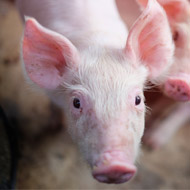Researchers set to develop African Swine Fever antivirals

"Having a tool which could lower the risk of further transmission once pigs have been infected would go a long way in preventing the rapid spread of this disease" - Dr Linda Dixon.
The first antiviral drugs that are effective against African Swine Fever (ASF) are set to be developed by researchers at The Pirbright Institute.
It is hoped that in the absence of a vaccine, antiviral drugs could offer an alternative method of control that would help limit clinical signs in pigs and reduce virus replication. In turn, this would minimise disease spread and help to contain outbreaks, ultimately reducing the number of pigs lost to this fatal infection.
Working with Belgian biotechnology firm ViroVet, the researchers will test antiviral drugs that have already been screened in the laboratory and shown to reduce viral replication in the absence of cellular toxicity. Up to now, the antivirals have shown a minimum of 90 per cent reduction in viral replication. The candidates that are most successful will undergo further testing at Pirbright’s high containment facilities.
Dr Linda Dixon, head of the African Swine Fever group at Pirbright, said: “The unique experience of ViroVet makes them the ideal company to partner with on this project. The results from this study will help us understand more about how the virus infects pigs and will help to inform our vaccine development research.
“Without a viable vaccine, ASF is incredibly difficult to control owing to its ability to be spread by wild boar and through the consumption of contaminated pork and other products by pigs. Having a tool which could lower the risk of further transmission once pigs have been infected would go a long way in preventing the rapid spread of this disease.”
Dr Nesya Goris, chief development officer and co-founder of ViroVet added: “This joint research will help us select a potent antiviral drug that could stop transmission of ASF from infected animals and prevent spread to healthy pigs.
“We are extremely proud and honoured to partner with the expert scientists of The Pirbright Institute. The study will help advance the new concept of ASF containment using antiviral drugs.”



 RCVS Knowledge has welcomed Professor Peter Cockcroft as editor-in-chief for Veterinary Evidence.
RCVS Knowledge has welcomed Professor Peter Cockcroft as editor-in-chief for Veterinary Evidence.